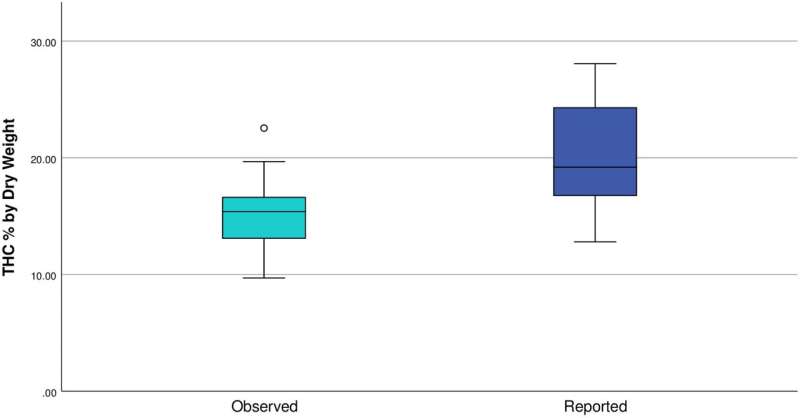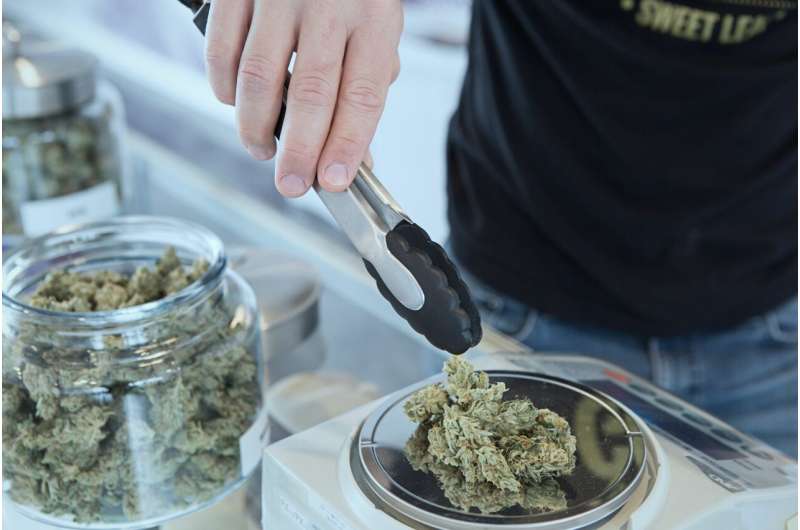Researchers at the University of Northern Colorado teamed up with folks at Mile High Labs in Colorado to interrogate the THC potency claims of cannabis retailers. In the study “Uncomfortably high: Testing reveals inflated THC potency on retail Cannabis labels” published in PLOS ONE, researchers found that labeling did not match the verification tests.
All cannabis test samples were purchased from licensed Colorado dispensaries. Testing was performed by Mile High Labs, which, as the name implies, is located near Denver, Colorado, a city nicknamed Mile High City because it sits one mile above sea level and also because the lab refines cannabis products.
Using High-Performance Liquid Chromatography, Mile High Lab techs tested 23 samples (1–2 grams per sample) representing 12 strains purchased from 10 Colorado dispensaries. Strains were chosen to represent a diversity of reported THC % by dry weight from 12.8% to 33.0%.
Label information was recorded as it was printed on the packaging. Some labels reported a range of THC, and some reported a single number though it was unclear to researchers if the single values reported were an average of multiple tests or the result of a single test.
The average observed THC potency was 23.1% lower than the lowest label reported values and 35.6% lower than the highest label reported values. Overall, ~70% of the samples were more than 15% lower than the THC potency numbers reported on the label, with three samples having only half of the reported maximum THC potency. 13 of 23 tested samples had observed values that were more than 30% lower than the lowest reported value.

While the research was not set up to explain the THC potency discrepancies, only to detect them, they did rule out a few possibilities. The sample testing used by the dispensaries could be different.
The testing instrumentation used by Mile High Labs is the most common method used in Colorado, with all ten current testing labs advertising High-Performance Liquid Chromatography as the method used. So all of the samples, if tested by a different methodology, would need to be sent out of the area, a practice that could be seen as “lab shopping” to obtain higher THC potency results.
Researchers considered the possibility of THC degradation. According to previous research, when stored at room temperature, THC potency decreases by ~17% after one year and up to~ 41% after four years. When THC degrades this way, it is converted to cannabinol (CBN) which was not observed in sizeable enough quantities in the study, indicating the lower potency values were not due to age or poor storage conditions.
The authors also mention the possibility of an economic incentive related to THC labeling, as consumers are willing to pay a premium for higher-potency cannabis. This suggests a motive at least for intentionally inflated THC potency by only sending the highest potency samples for testing, lab shopping for more favorable analysis, or directly presenting erroneous data.
The researchers conclude that it is urgent steps are taken to increase the accuracy of cannabis labeling as a lack of accurate potency reporting could have impacts on medical patients controlling dosage. Additionally, recreational consumers should be getting what they pay for. As the legal cannabis market continues to grow, it is essential that the industry moves toward selling products with more accurate labeling or risk losing trust in the industry as a whole.
More information:
Anna L. Schwabe et al, Uncomfortably high: Testing reveals inflated THC potency on retail Cannabis labels, PLOS ONE (2023). DOI: 10.1371/journal.pone.0282396
© 2023 Science X Network
Citation:
Discrepancies at the dispensaries: Study finds THC potency much lower than labeled (2023, April 13)
retrieved 16 April 2023
from https://medicalxpress.com/news/2023-04-discrepancies-dispensaries-thc-potency.html
This document is subject to copyright. Apart from any fair dealing for the purpose of private study or research, no
part may be reproduced without the written permission. The content is provided for information purposes only.


